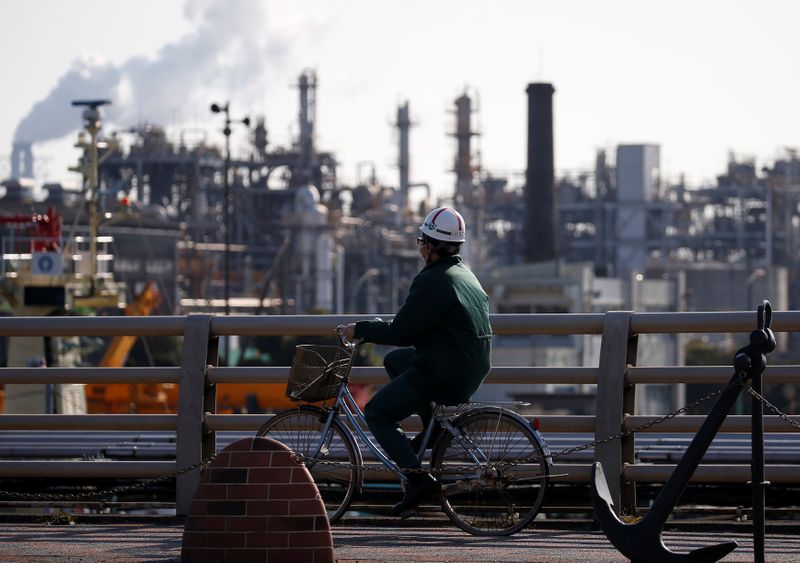By Daniel Leussink and Kaori Kaneko
TOKYO (Reuters) - Japan's industrial output extended declines in December as factories struggled with a hit to demand from expanded COVID-19 lockdown measures globally, suggesting the economic recovery was slowing.
The output slowdown may fan worries that the world's third-largest economy has failed to secure a firm footing after last year's sharp recession as businesses are pressured by a wider, local state of emergency covering parts of the country, including Tokyo.
Separate data showed the average number of available jobs per applicant for 2020 saw its biggest decline in 45 years, while the average jobless rate last year rose for the first time in 11 years.
Official data released on Friday showed factory output declined 1.6% in December, as falling production of general machinery and cars offset strength in inorganic and organic chemicals manufacturing.
The decline was larger than the previous month's 0.5% fall, but broadly in line with a 1.5% decline in a Reuters poll of economists.
"Output will likely be positive in the first quarter, but we expect (economic) growth to be negative. The biggest reason is the contraction in private spending due to the state of emergency," said Takumi Tsunoda, senior economist at Shinkin Central Bank.
While the economy was likely to contract by around 5% on a year-on-year basis in the first quarter, it was still expected to avoid a technical recession--two straight quarters of decline--thanks to a second-quarter rebound in exports and output, he said.
Manufacturers surveyed by the Ministry of Economy, Trade and Industry (METI) expected output to rebound 8.9% in January and decline 0.3% in February.
Although production was still likely to grow at a sharp pace in January, manufacturers' forecasts didn't fully reflect the impact of Japan's new state of emergency, a trade ministry official said.
Factory output weakened in November as a rebound in car production ended on sagging global demand. Analysts worry that is delaying Japan's recovery with the economy at risk from starting the year with a contraction.
COVID-19 HURTS JOBS
Official data on Friday also showed the average jobs-to-applicants ratio for 2020 was 1.18, down 0.42 point from 2019, its biggest annual fall since 1975. The ratio was unchanged at 1.06 in December from the previous month.
Other data showed the average jobless rate stood at 2.8% in 2020, up for the first time since 2009 when the Lehman Brothers collapse hit the employment sector.
An average of 2.56 million people per month were furloughed last year, the highest since comparable data became available in 1968.
The country's seasonally adjusted jobless rate held steady at 2.9% in December, beating the median estimate of 3.0%.
Meanwhile, the core consumer price index for Tokyo, which includes oil products but excludes fresh food prices, fell 0.4% in January from a year earlier, down for a sixth straight month, government data showed on Friday.

In the consumer sector, sentiment worsened in January, an official gauge showed on Friday, prompting the government to cut its view on the closely watched index, saying it was on a weak tone.